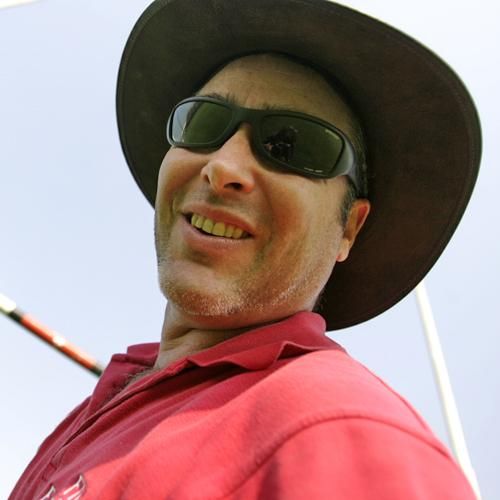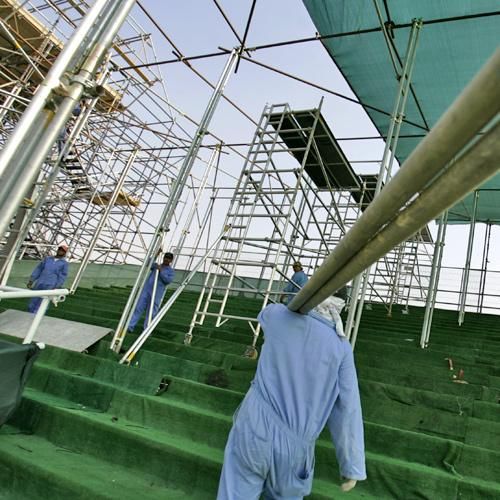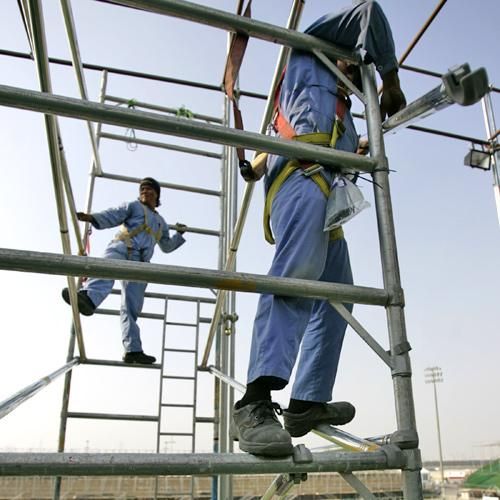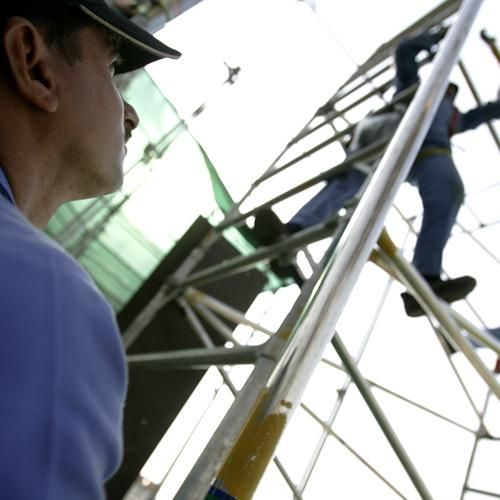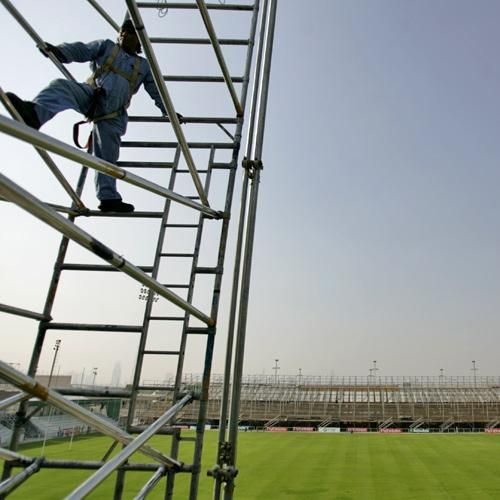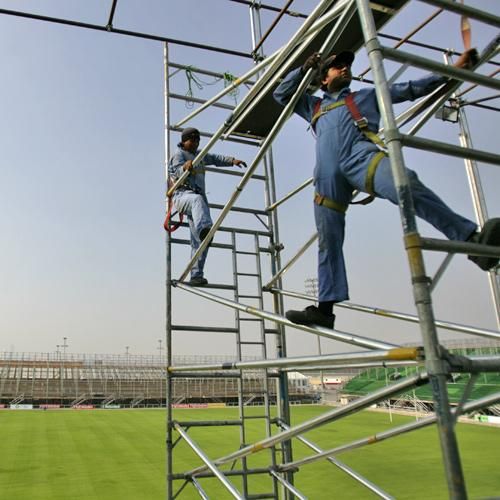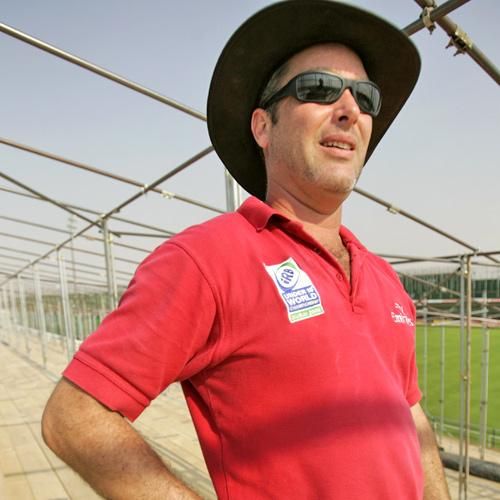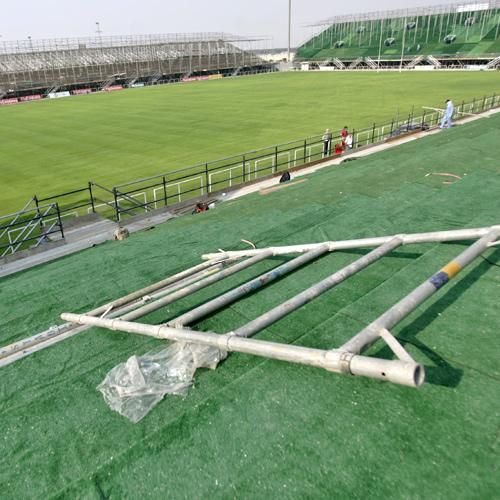It's a sticky November afternoon. Rob Hodson is out in the shimmering heat putting the finishing touches to the largest temporary stadium in the world.
As we chat, sitting high above the 150km of scaffolding used to construct the main stand, Rob's mobile rings with another query from a contractor. In fact, it hardly ever stops ringing.
"I've just had a carpet guy on the line," he tells the caller. "If I was to order 20 more rolls, would that cover it? I've got 18 already ... stick with that – 40 rolls then."
You get the feeling that Rob is always on the go. A former engineer on North Sea oil rigs, he has had many career changes – he was even an interior designer – before seven years ago he landed the "dream" job of, literally, building the Dubai Rugby Sevens.
Rob, a rugged Brit and site manager at Dubai Exiles Club, is employed by Promoseven, the Dubai-based company that runs sports events all over the Gulf. "Back in 2000 we were lucky if 7,000 people came each day," he says. "But since 2001 it has tripled in size. My job is to make sure that it will all run smoothly and people can enjoy themselves."
He makes it sound matter of fact, but taking a club rugby pitch and turning it into a world-class rugby stadium for a three-day event is an all-year round occupation.
He sits down in February with a blank sheet of paper. By August, the three-month job of erecting the stands is under way. On Sunday, the scaffolders will be back until January to dismantle the whole thing. Then Rob will start again. "Everything has to be brought in," says Rob. "We have to think of it in the tiniest detail. From the paper in the photocopiers, to the toilet rolls and Wi-Fi connections."
Looking at the mammoth steel skeleton rising from the sand the thought arises: wouldn't it be easier just to build a permanent stadium? "The great thing about doing it this way is that we can improve and change every year," says Rob.
And changes have been needed since last year, when the heavens opened and turned the site into a quagmire. Spectators were sloshing ankle deep through mud and water to get from car parks to the stands, while broadcasters had to abandon their commentary positions as the rain poured in.
"One of the big changes is that we now have only one main entrance and it will be easier to keep clear. We've raised that area so water will run away from it. It's one of the luxuries of this environment here. We can alter things to suit the event.
"We have put in machinery such as pumps in case the water hits. I wouldn't say we were complacent last year, but things were installed with ‘UAE weather' in mind."
The stadium will be buzzing with 30,000 people over the next three days and have the look and atmosphere of a permanent sports facility, something Rob is proud of. "This place grows a heart and a soul from about seven days before the event. It metamorphoses into something completely different."
This is the last year of the Sevens at this site, as the Exiles pack up soon and head for a new location.
But Rob says the set-up next year will be much the same. "There will be a permanent stand at the new facility, with bigger changing rooms and it will be more media-friendly.
"But so far as the seating goes we will stick with the same system. It is something that is pretty unique.
"People like the proximity to the pitch, they like that they can walk around it and socialise. They like the freedom. That's definitely something we will keep."
Doesn't the sheer scale of the event – more than 70,000 people through the gates over three days – start to make it unmanageable. "No," says Hodson firmly. "The police tell us it is their favourite event of the year – much easier to deal with than a pop concert.
"They love it – people simply out to enjoy themselves and some great sport. It is what they think Dubai's spirit is all about – a real family and community event.
"Everybody looks after each other. From the bank manager to the plumber they're here to enjoy the rugby and have a good time."
And after a year of hard graft, how does Hodson feel when the crowds finally go home. "I must admit," he says. "The only time I feel a bit sad and flat is the day after. But it doesn't last long. There's too much to do."
Sevens Stats
- The three days of the Dubai Rugby Sevens will see more than 70,000 people pass through the gates of the Exiles ground
- The tournament now has the largest temporary stadium in the world, seating 32,000 people
- It takes three months and more than 150 kilometres of scaffolding to build the stadium.
- It takes six weeks to dismantle the stadium after the event finishes
- More than 1,200 people work on the event
Dubai Sevens 2007
- Takes place at the Dubai Exiles rugby ground from today until Saturday, December 1
- This is its 38th year
- Emirates airline has been the official sponsor since 1988
- First day: Local club, international and invitational teams
- Second and third days: 16 major sides compete for the Emirates International Trophy
- Nearly 2,000 players will take part over the three days
- More than 12,000 visitors come from overseas
- TV coverage is beamed to 120 different countries from Europe to Australia
- Friday, Saturday and season tickets are now sold out
For more details visit www.dubairugby7s.com
The Birth Of The Dubai Exiles
Back in the 1960s, a small band of British expats decided they needed to bring rugby to the desert – primarily to curb their ever-increasing waistlines.
Forty years after they planted their little acorn it has grown into one of the premier rugby events in the world.
In 1966 the expats obtained a small plot of land in Bur Dubai with the help of Dubai Municipality, and set about levelling, grading, marking and erecting the posts – and so the Dubai Exiles were born.
Up The Pole
One Friday in 1968 the players arrived for a match and found a new line of telegraph poles running straight through the middle of the pitch. It was a big setback, but only for a short while. Dubai's Ruler, Shaikh Rashid Bin Saeed Al Maktoum, donated the land at Al Awir.
Only a year later, in 1969, with just a handful of fans scattered along the touchline, the Staffordshire Regiment were crowned as the inaugural Dubai Rugby Sevens champions.
Huge Growth
The growth of the tournament in the 1970s mirrored the growth of the Exiles Club. It may come as a surprise that the first matches were played on grass only in 1995, followed a year later by Dubai hosting a qualifying round of the Sevens World Cup.
The event has mushroomed in those past 11 years and since 2001 the sell-out tournament has tripled in size.


